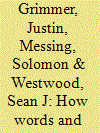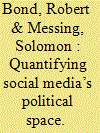| Srl | Item |
| 1 |
ID:
118969


|
|
|
|
|
| Publication |
2013.
|
| Summary/Abstract |
Particularistic spending, a large literature argues, builds support for incumbents. This literature equates money spent in the district with the credit constituents allocate. Yet, constituents lack the necessary information and motivation to allocate credit in this way. We use extensive observational and experimental evidence to show how legislators' credit claiming messages-and not just money spent in the district-affect how constituents allocate credit. Legislators use credit claiming messages to influence the expenditures they receive credit for and to affect how closely they are associated with spending in the district. Constituents are responsive to credit claiming messages-they build more support than other nonpartisan messages. But contrary to expectations from other studies, constituents are more responsive to the total number of messages sent rather than the amount claimed. Our results have broad implications for political representation, the personal vote, and the study of U.S. Congressional elections.
|
|
|
|
|
|
|
|
|
|
|
|
|
|
|
|
| 2 |
ID:
141643


|
|
|
|
|
| Summary/Abstract |
We demonstrate that social media data represent a useful resource for testing models of legislative and individual-level political behavior and attitudes. First, we develop a model to estimate the ideology of politicians and their supporters using social media data on individual citizens’ endorsements of political figures. Our measure allows us to place politicians and more than 6 million citizens who are active in social media on the same metric. We validate the ideological estimates that result from the scaling process by showing they correlate highly with existing measures of ideology from Congress, and with individual-level self-reported political views. Finally, we use these measures to study the relationship between ideology and age, social relationships and ideology, and the relationship between friend ideology and turnout.
|
|
|
|
|
|
|
|
|
|
|
|
|
|
|
|